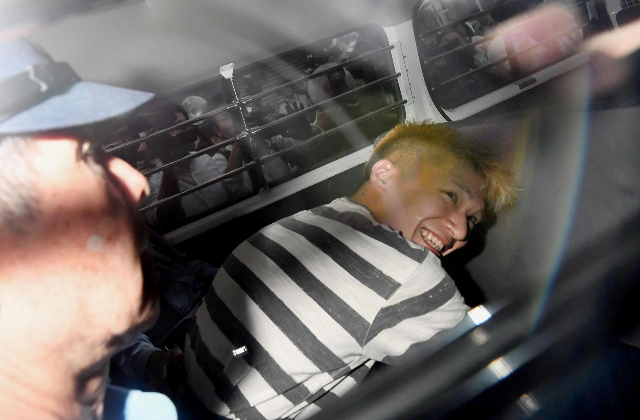Japanese man pleads not guilty to killing 19 due to mental health
Uematsu's lawyer says his abuse of marijuana led to the mental illness

Satoshi Uematsu, suspected of a deadly attack at a facility for the disabled, is seen inside a police car as he is taken to prosecutors, at Tsukui police station in Sagamihara, Kanagawa prefecture, Japan. PHOTO: Reuters
Satoshi Uematsu, 29, a former care home worker accused of killing 19 disabled people and wounding 26 in a care center in 2016 - one of post-war Japan’s worst mass killings - was removed from the court and did not return when the trial resumed.
Before the interruption, Uematsu’s lawyer said Uematsu acknowledged details of the indictment were true, but he has a psychiatric disorder that led to diminished capacity at the time of the incident.
“Mr Uematsu had a psychiatric disability and, as a result, he was not mentally competent,” said the lawyer.
Japanese man who paid for sex with 12,000 women arrested
A calm-looking Uematsu, wearing a navy blue suit, white shirt and tie, and with his hair in a long pony tail, bowed slightly as he entered the courtroom, Japanese media said.
Soon after, Uematsu suddenly made motions as if to put something in his mouth, Japanese media said. A Reuters witness saw him struggling with uniformed court officials, writhing on the floor as three of them held him down, before the hearing was abruptly adjourned for about an hour.
Once resumed, without Uematsu in attendance, one of his lawyers said his abuse of marijuana led to mental illness, adding: “This has turned him into a different person. As a result, this incident took place.”
But a prosecutor told the court any potential sentence would have to take into consideration the brutality and scale of the crime, noting that Uematsu had stabbed many victims in the neck.
“(Uematsu) had the capacity to tell good from bad, and capacity to control his conduct as well,” she added. “We will prove he was completely responsible for what he did.”
Family members of the victims watched from a screened off area of the courtroom.
The July 2016 killings at the facility in Sagamihara, southwest of Tokyo, where Uematsu had once worked, shocked the country, as violent crime is rare due to strict gun control.
Interest in the trial was intense, with nearly 2,000 people lining up in cold rain for 26 viewing seats, and broadcast trucks lined the streets in front of the courthouse.
The violence also sparked debate about the need for change in a society where people with disabilities can still suffer stigma and shame, a situation highlighted by the fact that the families of most of those killed have not revealed their names.
Japanese man, 71, arrested for 'making 24,000 complaint calls'
One woman on Wednesday told NHK national broadcaster that Uematsu’s trial prompted her to change her mind about concealing the name of her daughter, 19 when she was killed.
Photos showed the young woman, who was autistic and unable to speak, smiling shyly in a photo taken by her mother soon after she entered the care home, just months before she was killed.
“She loved music, she lived as energetically as she could,” her mother wrote in the statement carried by NHK, saying she last saw her daughter two days before her death.
“Her name was Miho. I want that public as proof that she existed. I want people to know who she was.”



















COMMENTS
Comments are moderated and generally will be posted if they are on-topic and not abusive.
For more information, please see our Comments FAQ